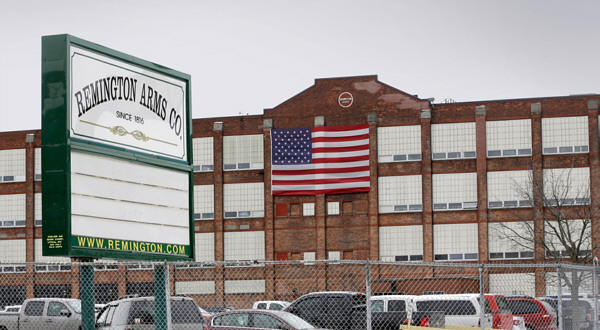

America Loses Its Oldest Factory—
Yeah, a Gun Factory

Image: Mike Groll/AP
By Frank Miniter. Feb 21, 2024
Article Source
Gone is America's oldest factory, Remington Arms in Ilion, N.Y. Silenced are machines making Model 870 pump-action shotguns and Model 700 bolt-action rifles in the nearly one-million-square-foot facility. Gone are jobs for the men and women in a small town in upstate New York. Gone is a factory founded in 1816 by Eliphalet Remington.
It's gone to the dust heap of American industrial history. Like many, I have visited this multi-level series of brick buildings in Ilion many times and found it filled with row after row of humming computer numerically controlled (CNC) machines and grating, pounding, half-a-century-old, grease-stained lathes and barrel reamers. Over more than two centuries, the factory grew into such a complex series of buildings and floors, it would give an architect an anxiety disorder. You could walk from one building to another and change floors without using stairs or an elevator or even getting the notion you're going up or down. Indeed, this old soot-soiled factory was America's oldest factory still making its original product—guns. In October of 2013, about 1,400 employees were making 4,900 guns per day in this factory. More recently, the Ilion plant had about 230 workers.
Now its old floorboards, reeking of machine oil and smoothed by the boots of men and women for generations, will gather dust. And this would be a little less painful if this old factory had simply been slain by the creative destruction of American capitalism, of newer factories with more modern machines staffed with engineers with more-popular ideas. But politics is part of the reason for the death of this historic factory.
Remington's press release was corporate and polite when it said, "Chief Executive Officer, Kenneth R. D'Arcy today announced that RemArms, America's oldest firearms brand, will consolidate its firearms operations in LaGrange, Georgia. This will align all firearms manufacturing with our planned global headquarters and world class R&D facility in Georgia, which supports and welcomes the firearms industry. 'We are deeply saddened by the closing of the historic facility in Ilion. We have a dedicated workforce at the Ilion facility, but maintaining and operating those very old buildings is cost prohibitive, and NY's legislative environment remains a concern for our industry.'"
All true. Anyone who walked among that sprawling factory's vast rooms could see outdated eras of machines, many sitting silent as testaments to what was. But they also would have seen the changes, as I did when I visited the historic landmark and working wonder of a factory many times. Various things were tried by a series of owners and management teams to save the place. It was such an impressive holdout that everyone, except for a lot of politicians in Albany, wanted to save it.
I remember about a decade ago walking in and having a lady in the front receive me in a small museum the factory had near its waiting area—one that had many of the guns, as well as the bicycles and typewriters and more the factory had turned out—and say to me, "So, you're a journalist! You are going to treat us better than most reporters, I hope."
Yes, ma'am," I said and smiled.
Walking in, I once again felt like a kid would going into Willy Wonka's chocolate factory. Indeed, on my first visit, they even had a "Willy Wonka Machine," as an engineer called it. It had all these belts and moving parts and was from an era before CNC. It would huff and puff and make all kinds of noises and finally some little part would pop out on the far end. I laughed and applauded and was sad when it wasn't there the next time I visited.
This isn't to say I found the place lost in time. It was just that you could see the history everywhere. It was like a very old home that, to be saved, required a lot of investment. There also had been some mismanagement from previous owners and expensive lawsuits. But Remington's shift to making guns in other states also reeks of politics. A lot of politicians in New York state have been at war with our Second Amendment freedom for a long time now.
New York Congresswoman Elise Stefanik (R) made this clear when she wrote, "It is because of New York Democrats' unconstitutional gun-grab policies that the oldest gun manufacturer in the country has been run out of the state."
This Remington factory—started when James Madison was president of the United States—did outlive many that have long sat still as brick skeletons of what was on the edges of small towns in New York and New England, but it could not outlast New York's anti-Second Amendment politics.
I would say the Remington Arms factory should be a museum to American mercantilism—and it would be a cool one—but who would come? It is in a tiny town off a highway in upstate New York.
Remington's many fine and working-class guns, of course, are still being made. They are being churned out in freer states. That's America, too; it's a land in which people and factories can vote with their dollars and their residencies.
![]()
























